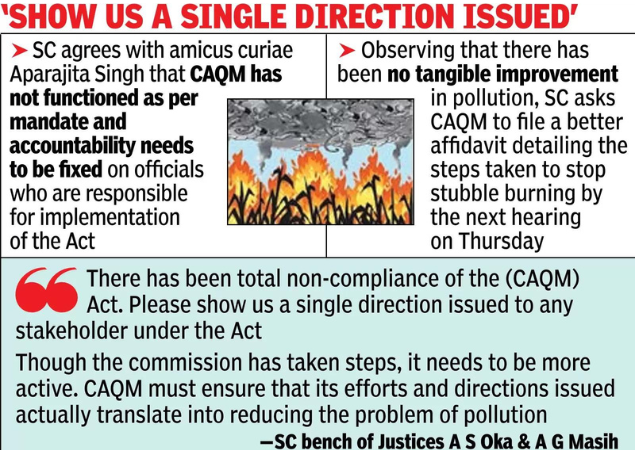At a time when authorities are wary of taking action against those burning crop residue prior to Haryana elections, the beginning of stubble burning in Punjab-Haryana that fouls winter air in Delhi and NCR made the Supreme Court on Friday rap the Commission of Air Quality Management (CAQM) for inaction and ask why no penal action is taken to stop farm fires.
A bench of Justices A S Oka and A G Masih said though the CAQM Act was enacted vesting the commission with vast powers, no tangible results have been achieved on the ground as the pollution level showed no signs of improvement every year during the winter. “There has been total non-compliance of the Act. Please show us a single direction issued to any stakeholder under the Act,” the bench said.

Additional solicitor general Aishwarya Bhati, appearing for the Centre, informed the court about the steps taken, such as issuing advisories and guidelines, to control stubble burning. However, the top court remarked, “It is all in the air, nothing has been shown regarding what has been done in the National Capital Region (NCR) states.”
“We are of the view that though the Commission has taken steps, it needs to be more active. It must ensure that its efforts and directions issued translate into reducing the problem of pollution.”
Agreeing with amicus curiae and senior advocate Aparajita Singh that CAQM has not functioned as per the mandate of the law and that accountability needs to be fixed on officials responsible for implementation of the Act, the bench said if penal action is not taken as per Section 14 of the CAQM Act, prohibitory orders against farm fires would remain only on paper.
It asked the commission to file a better affidavit detailing steps taken to stop stubble burning by Thursday, the next date of hearing. Bhati said that Centre is helping the state govt in every possible way, including supply of machinery, to persuade farmers not to burn the crop residue. The bench asked the Centre to check whether the machinery has been used by farmers.
When the bench repeatedly asked what concrete action was taken against those who indulge in stubble burning, Bhati said even section 14 of the CAQM Act which punishes those who flout commission’s order with imprisonment up to five years, completely exempts farmers. “Authorities have to do hand-holding and persuade the farmers not to resort to stubble burning,” she said.
The proviso to Section 14 of the Act says, “Provisions of this section shall not apply to any farmer for causing air pollution by stubble burning or mismanagement of agricultural residue.”
In fact, a bench of Justices S K Kaul and S Dhulia had on Nov 7 last year ordered authorities to forthwith stop farmers from stubble burning and made local police under the overall supervision of the DGP and chief secretary responsible for stopping crop residue burning. However, farm fires continued through most of the month with farmers refusing to bow to persuasion or threat of coercive action.
Justices Oka and Masih accepted amicus curiae’s suggestions that central pollution control board and all other bodies regulating air pollution in NCR be directed to tag the CAQM with the implementing authority concerned while responding to complaints on social media page to help better monitoring of pollution hot spots and taking of urgent remedial measures. CAQM in its affidavit informed the SC that “owing to systematic planning and concerted actions for implementation of action plans framed on a year-to-year basis”, there has been a significant reduction in farm fire incidents. It said between 2021 and 2023, farm fire incidents in Punjab went down from 71,304 to 36,663; In Haryana from 6,987 to 2,303; and NCR, UP and Rajasthan from 78,550 to 39,186.


